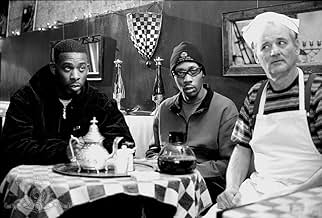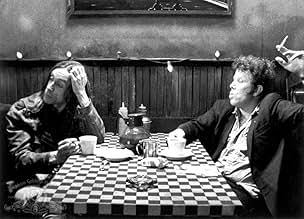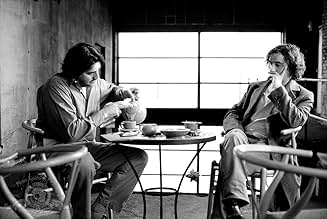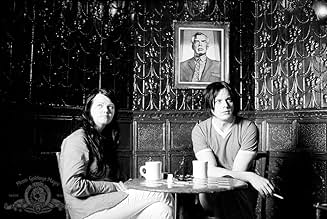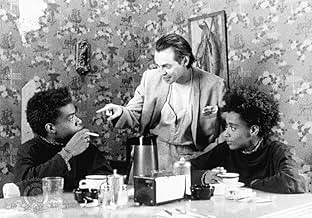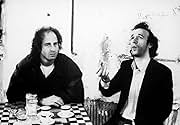PUNTUACIÓN EN IMDb
7,0/10
69 mil
TU PUNTUACIÓN
La historia explora el comportamiento humano después de tomar café y cigarrillos todos los días.La historia explora el comportamiento humano después de tomar café y cigarrillos todos los días.La historia explora el comportamiento humano después de tomar café y cigarrillos todos los días.
- Premios
- 2 premios y 9 nominaciones en total
Joseph Rigano
- Joe (segment "Those Things'll Kill Ya")
- (as Joe Rigano)
Renee French
- Renée (segment "Renée")
- (as Renée French)
Michael Hogan
- Waiter (segment "Cousins")
- (as Mike Hogan)
Argumento
¿Sabías que...?
- CuriosidadesThis film was made over a 17-year period. The Roberto Benigni and Steven Wright segment was filmed in 1986. The Tom Waits and Iggy Pop segment was shot in 1995.
- PifiasThe page showing in Renee French's weapon magazine varies between shots, even when she isn't turning the pages.
- Créditos adicionalesThe credits end with a list of the historical, scientific, musical, and cinema-related figures that are mentioned or referenced throughout the film: "RESPECT TO: Nikola Tesla, Otis Blackwell, Junior Parker, Elvis Presley, Jesse Garon Presley, Lee Marvin, Henry Silva, Giant Robo, Heckle & Jeckle, Abbott & Costello, Vivienne Westwood, Spike Jonze, Spike Lee, Sam Mendes, PT Anderson, Michael Winterbottom, Harold Ramis, Gary Goldberg, Ghostface Killa, Old Dirty Bastard and the rock band Tesla...in a way..." After this list it closes with the memorial: "LONG LIVE JOE STRUMMER!"
- ConexionesEdited from Coffee and Cigarettes (1986)
- Banda sonoraLouie Louie
Written by Richard Berry
Performed by Richard Berry & The Pharoahs
(c) 1957 Renewed EMI Longitude Music Co.
Courtesy of Ace Records Ltd. c/o Original Sound Entertainment
Reseña destacada
--Mild spoilers--
I haven't seen a single Jarmusch before this and have no knowledge or his style whatsoever, nor have I smoked a cigarette while drinking coffee, but I enjoyed this film immensely.
It doesn't purport to speak of grandiose themes and epic emotions, nor does it go out of its way to be deliberately offbeat and quirky; the audience has no emotional attachment to the characters and there is no plot in most of the vignettes. So what puts this film above all the pretentiously shot black-and-white art-house crap that is slugged out every year? For one thing, it is really funny. From its expressionistic colors to the dialog that proudly smacks of absurdist humor, this film is like a breeze of cool air, utterly enjoyable from the first reel to the last that does not cloy on to the heart, but is very unforgettable.
Ultimately, its unobtrusive absurdist humor, which provokes chuckles instead of heartily laughs, serves to prove the Pinter-esquire themes of the futility of communication. We get a sense that the characters are isolated and desperately trying to touch each other through their speech but ultimately failing to do so; and yet, through their manic speech patterns and delirious pauses, what is unsaid speaks more than what is said itself. While this unconventional style of humor is often difficult to pull off as it might fast become monotonous (as evident in a recent stage production of The Caretaker that I saw), Jarmusch's deft direction with his actors (from their gestures to the way they hold their coffee cups) pushes forth the humor and carries it on steadily throughout the entire film.
It is hard to say much about a film who has nothing much to say. As in my favorite segment, 'No Problem', the one with the two French black guys, their dialog only serves to underscore the meaningless and nothingness of communication. What is scary about it is that it is so accurate, that these type of conversations, however ridiculous and absurd when portrayed on screen, often typifies our daily conversations. It depresses me sometimes that human communication can be easily reduced to all these, and this film makes the point entirely clear.
So it definitely comes as a relief, that as a conclusion, the relatively more heart-warming vignette with the two old guys (Champagne) was chosen. Not only does it touches lightly on the recurring 'acoustic resonance' theme, it also hints that we may in fact touch each other, through common music or through a common idea. And it just happens that that common song was 'I have Lost Track of the World' by Gustav Mahler, an amazing piece by an amazing composer that I have just recently began to love, a delightful moment which shows that although we are as disconnected at the different vignettes in the movie, it is comforting to know that we are still united in some weird cosmic way, like this forum here. And like the two old guys, after our coffee and cigarette break in which we step into an odd world that is not really unfamiliar, we would have to step back in to the real world again. But it doesn't hurt to have a little nap in between and pretend bad coffee is champagne.
I haven't seen a single Jarmusch before this and have no knowledge or his style whatsoever, nor have I smoked a cigarette while drinking coffee, but I enjoyed this film immensely.
It doesn't purport to speak of grandiose themes and epic emotions, nor does it go out of its way to be deliberately offbeat and quirky; the audience has no emotional attachment to the characters and there is no plot in most of the vignettes. So what puts this film above all the pretentiously shot black-and-white art-house crap that is slugged out every year? For one thing, it is really funny. From its expressionistic colors to the dialog that proudly smacks of absurdist humor, this film is like a breeze of cool air, utterly enjoyable from the first reel to the last that does not cloy on to the heart, but is very unforgettable.
Ultimately, its unobtrusive absurdist humor, which provokes chuckles instead of heartily laughs, serves to prove the Pinter-esquire themes of the futility of communication. We get a sense that the characters are isolated and desperately trying to touch each other through their speech but ultimately failing to do so; and yet, through their manic speech patterns and delirious pauses, what is unsaid speaks more than what is said itself. While this unconventional style of humor is often difficult to pull off as it might fast become monotonous (as evident in a recent stage production of The Caretaker that I saw), Jarmusch's deft direction with his actors (from their gestures to the way they hold their coffee cups) pushes forth the humor and carries it on steadily throughout the entire film.
It is hard to say much about a film who has nothing much to say. As in my favorite segment, 'No Problem', the one with the two French black guys, their dialog only serves to underscore the meaningless and nothingness of communication. What is scary about it is that it is so accurate, that these type of conversations, however ridiculous and absurd when portrayed on screen, often typifies our daily conversations. It depresses me sometimes that human communication can be easily reduced to all these, and this film makes the point entirely clear.
So it definitely comes as a relief, that as a conclusion, the relatively more heart-warming vignette with the two old guys (Champagne) was chosen. Not only does it touches lightly on the recurring 'acoustic resonance' theme, it also hints that we may in fact touch each other, through common music or through a common idea. And it just happens that that common song was 'I have Lost Track of the World' by Gustav Mahler, an amazing piece by an amazing composer that I have just recently began to love, a delightful moment which shows that although we are as disconnected at the different vignettes in the movie, it is comforting to know that we are still united in some weird cosmic way, like this forum here. And like the two old guys, after our coffee and cigarette break in which we step into an odd world that is not really unfamiliar, we would have to step back in to the real world again. But it doesn't hurt to have a little nap in between and pretend bad coffee is champagne.
- danielhsf
- 10 feb 2005
- Enlace permanente
Selecciones populares
Inicia sesión para calificar y añadir a tu lista para recibir recomendaciones personalizadas
- How long is Coffee and Cigarettes?Con tecnología de Alexa
Detalles
Taquilla
- Recaudación en Estados Unidos y Canadá
- 2.198.924 US$
- Fin de semana de estreno en EE. UU. y Canadá
- 99.162 US$
- 16 may 2004
- Recaudación en todo el mundo
- 8.016.524 US$
- Duración1 hora 35 minutos
- Color
- Mezcla de sonido
- Relación de aspecto
- 1.85 : 1
Contribuir a esta página
Sugerir un cambio o añadir el contenido que falta

Principal laguna de datos
By what name was Coffee and Cigarettes (2003) officially released in India in English?
Responde
![Ver Trailer [EN]](https://m.media-amazon.com/images/M/MV5BZGQ3Zjk3OWItZGEyOC00YTkyLWFjMmMtOGYzNjBjN2ZkMDM2XkEyXkFqcGdeQXRyYW5zY29kZS13b3JrZmxvdw@@._V1_QL75_UX500_CR0)

